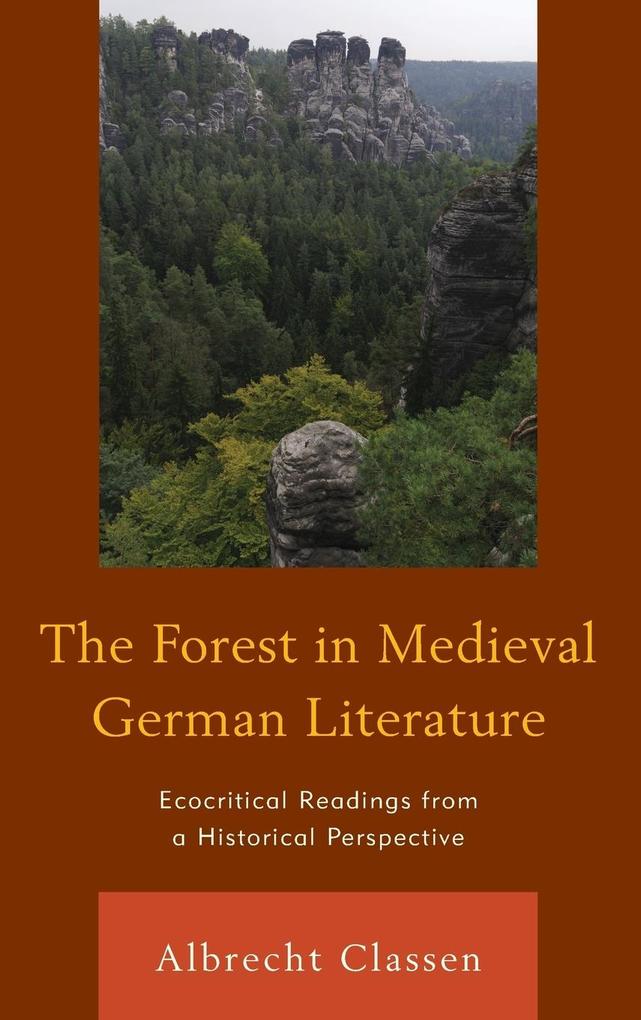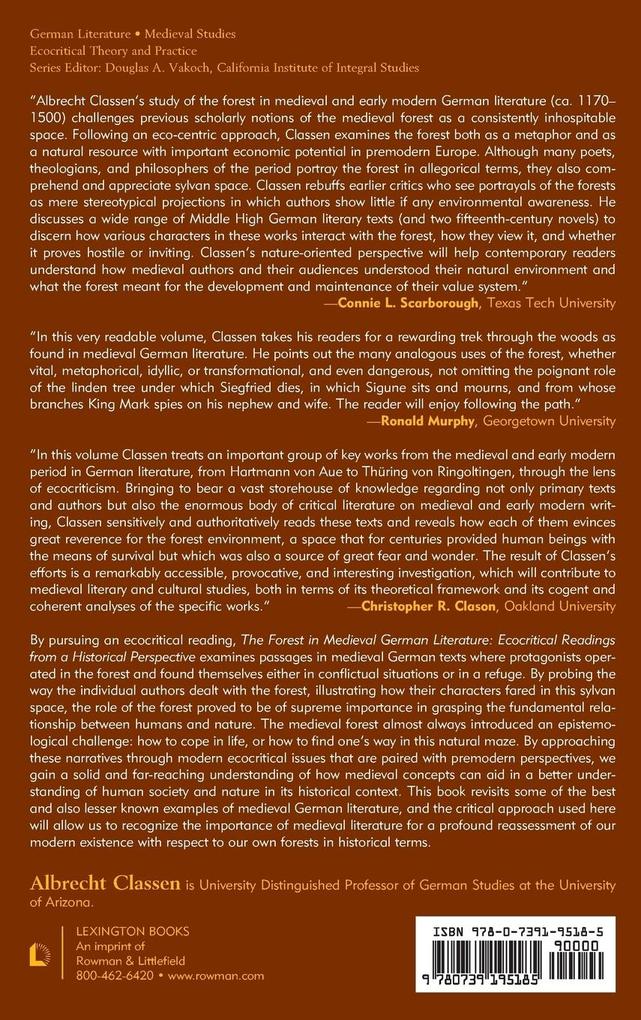
Zustellung: Mi, 02.07. - Sa, 05.07.
Versand in 1-2 Wochen
VersandkostenfreiBestellen & in Filiale abholen:
The Forest in Medieval German Literature analyzes the topic of the "forest" through some of the best and lesser known examples of medieval German literature, approaching them through modern ecocritical issues that are paired with premodern perspectives.
Inhaltsverzeichnis
Acknowledgements
Introduction and Theoretical Reflections:
The Forest as an Epistemological Challenge in the Middle Ages
Chapter One:
Hartmann von Aue's Concept of the Forest:
The Arthurian Adventure in the Forest and the Consequences
Chapter Two:
The Forest as Staging Ground for the Heroic Protagonist:
Glory and Demise in the Nibelungenlied
Chapter Three:
The Forest in Wolfram von Eschenbach's Works:
The Passage from the Arthurian Court
to the Grail Kingdom Through the Forest
Chapter Four:
The Forest in Gottfried von Straß burg's Tristan
and in Alternative Tristan Versions
Chapter Five:
The Forest in Der Melerantz von Frankreich by The Pleier
Chapter Six:
The Forest as the Transitional and Transformative Space
in Konrad von Wü rzburg's Partonopier und Meliur
Chapter Seven:
The Ambivalence of the Forest: Exile or Safe Haven?
The Destiny of the Female Protagonist Refracted in the Forest:
Elisabeth von Nassau-Saarbrü cken's Kö nigin Sibille
Chapter Eight:
Forest in Thü ring von Ringoltingen's Melusine:
Dark Spaces, Mysterious Origins, Meaningful Connections:
The Forest and the Establishment of Dynasties
Epilogue
Bibliography
Index
Introduction and Theoretical Reflections:
The Forest as an Epistemological Challenge in the Middle Ages
Chapter One:
Hartmann von Aue's Concept of the Forest:
The Arthurian Adventure in the Forest and the Consequences
Chapter Two:
The Forest as Staging Ground for the Heroic Protagonist:
Glory and Demise in the Nibelungenlied
Chapter Three:
The Forest in Wolfram von Eschenbach's Works:
The Passage from the Arthurian Court
to the Grail Kingdom Through the Forest
Chapter Four:
The Forest in Gottfried von Straß burg's Tristan
and in Alternative Tristan Versions
Chapter Five:
The Forest in Der Melerantz von Frankreich by The Pleier
Chapter Six:
The Forest as the Transitional and Transformative Space
in Konrad von Wü rzburg's Partonopier und Meliur
Chapter Seven:
The Ambivalence of the Forest: Exile or Safe Haven?
The Destiny of the Female Protagonist Refracted in the Forest:
Elisabeth von Nassau-Saarbrü cken's Kö nigin Sibille
Chapter Eight:
Forest in Thü ring von Ringoltingen's Melusine:
Dark Spaces, Mysterious Origins, Meaningful Connections:
The Forest and the Establishment of Dynasties
Epilogue
Bibliography
Index
Produktdetails
Erscheinungsdatum
03. Juni 2015
Sprache
englisch
Seitenanzahl
254
Autor/Autorin
Albrecht Classen
Verlag/Hersteller
Produktart
gebunden
Gewicht
568 g
Größe (L/B/H)
235/157/20 mm
ISBN
9780739195185
Entdecken Sie mehr
Bewertungen
0 Bewertungen
Es wurden noch keine Bewertungen abgegeben. Schreiben Sie die erste Bewertung zu "Forest in Medieval German Literature" und helfen Sie damit anderen bei der Kaufentscheidung.










